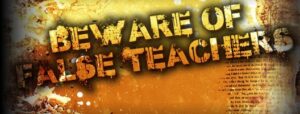
The author of the book of Hebrews writes, “Long ago God spoke many times and in many ways to our ancestors through the prophets. but in these last days he has spoken to us by his Son.”
The “long ago” (read: in the past) of verse 1 is contrasted with the opposing “but in these last days” (read: now) of verse 2.
Even though the office of “prophet” (noun) has been replaced by the final, greater, ultimate Prophet—Yahweh’s son Jesus Christ, His Word, and His Spirit—this does not mean that the gift of “prophesying” (verb) is still not at play. In other words, there is a vast world of difference between “being a prophet’ and having a “gift of prophecy.”
But before we determine whether we have such a gift, knowing exactly what the gift really is, is of vital importance. A mis-identification of the gift and its purposes will inevitably open us up to error, abuse, ignorance, deception, apostasy, judgment, false doctrine, and spiritual destruction.
Prophecy is NOT
Biblical Fortune Telling
Prophetic words will always come from God or His Spirit. Nothing will ever contradict what has already been revealed in the written Word. Prophecies will ultimately point to God, Jesus Christ, conviction of sin, or some ultimate purpose for mankind or the forwarding of God’s will. Every prophecy is a vital puzzle piece to the overarching plan of redemptive history from Genesis to Revelation.
Words of
divination will either come from one’s own
mind or imagination or from a demonic spirit or entity who is not speaking on
behalf of God. Their predictions may be good, spiritual, or even include Bible
references and Scripture…but they will ultimately point to self and one’s own
personal successes and failures, not to Jesus Christ, the Gospel, salvation, or
God’s will for mankind.
Biblical prophecy is not typically about “predicting the future.” Yahweh doesn’t waste His power performing parlor tricks for easily-awed human beings. In fact, the future is rarely predicted in much of the prophetic Scriptures because the future is oftentimes conditional, meaning, the final outcome is not yet set in stone. Many Old Testament prophecies included “if/then” clauses. “If you (Israel) do this; I (Yahweh) will do this.” Or, “If you (Israel) fail to do this; I (Yahweh) will then do this.” The Old Testament was a bit of a “Choose Your Own Adventure” novel, with the people of God being given “Plan A” and “Plan B” options.
Fortune telling, on the other hand, is typically all about (and only about) predicting the future. And while biblical prophecy is God-centered and Church-centered (involving the entire assembly of believers) fortune telling is self-centered and primarily revolves around the personal fate of one person, in one situation, at one point in time.
Biblical prophecy outlines global outcomes for an entire nation, people group, or all of mankind. Biblical prophecy is never trivial. The outcome of entire families, clans, people groups, and nations hang in the balance based upon their obedience or rebellion. Fortune telling tends to revolve around trivial or temporal life experiences that will play out one way or the other without any supernatural interference. (e.g. Am I going to get married? Is my baby going to be a boy or a girl? Am I going to get this job?)

Biblical prophecy leads to conviction of sin, a pursuit of holiness, and unity among believers. The if/then clauses of prophetic ultimatums affect our behavior and “force” people to unify—as the fates of all are collectively pooled together. In other words, if the nation of Israel sinned, everyone—including the righteous—were subject to famine, sword, pestilence, death, and captivity.
Fortune telling revolves around the dreams, desires, and wishes of an individual and has the best interests of the individual at heart. A “good fortune” is viewed in a vacuum that ignores the fates of those around that individual, with little to no regard to how the fulfillment of a prediction might negatively affect others. (For example, the “man of your dreams” may also the man of someone else’s dreams; or your dream job may mean having to fire a man with a sick wife and five kids).
Prophecy is not forbidden; whereas fortune telling (and divination of all kinds) are an abomination to God and we are commanded in Scripture to not practice these things or to consult with those who do.
Biblical prophecy is extremely detailed and every jot and tittle of it will come to pass. A lot of fortune tellers who predict the future today give extremely vague ideas with lots of fine print and loopholes (so they can worm their way out of it when it doesn’t come to pass).

A Word to the Wise
- Having a gift of prophecy does not mean every single word that
comes out of that person’s mouth is prophetic. Nor does it mean that a prophecy
will be revealed to that person every day (or multiple times a day) or that
they will have the gift their entire life.
- The Scriptures tell a story of King Saul prophecying…ONE TIME (1
Samuel 19:24), and never again. Daniel was given many dreams and visions and
then God told him it was finished, and He closed the books and basically told
Daniel to have a nice life (Daniel 12:9, 13).
- Many prophets in Scripture were not happy about the calling and several
of them attempted to run from it (Jonah, Moses, Isaiah). Others were defeated, terrified,
exhausted (Elijah) and depressed (Jeremiah). The prophets lived extremely difficult,
isolated, persecuted lives. They were hated by kings, political leaders, and
their own families and countrymen. They had to stand alone, go against the
grain, and were countercultural. (In modern times this would look like speaking
against the LGBTQ movement or getting unfriended by all your friends on social media).
Not to even mention that many of the biblical prophets spent a good deal of
their life in hiding, in prison, in chains, at the bottom of empty cisterns, or
killed.
- The gift of prophecy is steered and controlled by the Holy Spirit, NOT by the person with the gift. Merely prefacing every sentence with the phrase, ‘the Holy Spirit told me…” or “God told me to tell you…” does NOT make whatever comes next a “prophecy” or a “prophetic word” (especially if the forthcoming revelation does nothing to glorify God, convict sinners of their sin, or to further Christ’s kingdom). The story of the boy who cried wolf is a valuable one. If a person continually says, “the Holy Spirit told me, the Holy Spirit told me, the Holy Spirit told me…” even your God-fearing Christian friends will eventually tune you out. This will be a tragedy if and when the Holy Spirit actually DOES speak to this person…and no one heeds the warning because they had to endure years of their talk about what kind of toothpaste the Holy Spirit prefers and what day of the week the Holy Spirit insisted their husband mow the lawn.
Brothers and sisters, we are called to be fishers of men—not palm readers. We must set aside the crystal ball that sits swirling in our mind’s eye and be quick to hear and slow to speak (James 1:19). The Holy Spirit is not a heavenly tie breaker we use to manipulate people, gain popularity, or to control conversations. Jeremiah 1:9 should be our prayer every morning before we open our eyes, before we get out of bed, and before we open our mouths.
Then YAHWEH stretched out His hand and touched my mouth, and YAHWEH said to me, “Behold, I have put My words in your mouth.”
Jeremiah 1:9


